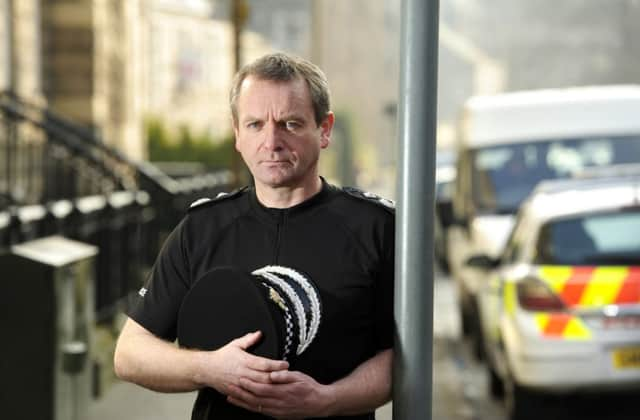Police put on alert over ‘lone wolf’ terror threat


Deputy Chief Constable Iain Livingstone said Police Scotland’s officers and staff had been briefed on a series of “protective measures”, including being careful about how they arrived for work and who they speak to while off duty.
Speaking to Scotland on Sunday, he said there was a growing concern that a terror attack carried out in Scotland would be perpetrated not by an organised cell but a “self- activating” individual or individuals, similar to those involved in the murder of soldier Lee Rigby.
Advertisement
Hide AdAdvertisement
Hide AdBut he warned the job of identifying those individuals was “extremely challenging”.
Police Scotland last week joined with forces across the UK in highlighting the raised threat level as part of Counter-terrorism Awareness Week.
The deputy chief constable said his force was monitoring an unspecified number of individuals as part of its counter-terrorism activities, but admitted it had been unaware of Aberdeen-raised Abdul Raqib Amin until he appeared in an Isis recruitment video, or former Glasgow schoolgirl Aqsa Mahmood, who quit her university studies to travel to Syria and marry a jihadist.
More than 500 Britons are thought to have travelled to Syria, although the actual figure could be much higher.
Last week the Metropolitan Police said “four or five” terror attacks had been foiled so far this year, but Livingstone said the most immediate threat to Scotland came from “lone actors”, essentially bedroom terrorists who had been radicalised by propaganda on the internet.
“What we’re trying to do is to raise people’s awareness that the threat now is diverse,” he said. “The idea that it’s going to be a cell-based entity that’s a long time in planning, that threat is still there, but what we’ve seen from the horrendous attack on Lee Rigby and other intelligence is that there is now a significant threat from lone actors, lone wolves, people who are rapidly radicalised and decide to take action.”
Livingstone said he had particular concerns for the safety of his own officers amid jihadist videos calling for followers to kill soldiers and police in their home country.
“I am concerned because there has been propaganda suggesting you attack soldiers and police officers of your enemy,” he said. “So we have raised basic safety and protective measures for police officers and staff. My own daughter is a police officer, so it’s a professional and personal responsibility that we as leaders of the service have to our own people.
Advertisement
Hide AdAdvertisement
Hide Ad“We need to make them alert without being alarmed and that, by raising their level of awareness, they don’t back away from engaging with the communities they serve.”
He said it was “untenable” to ask his officers to avoid social media in their private lives, but they had been urged to be cautious about revealing details of their duties and movements.
Livingstone, a former assistant chief constable of Lothian and Borders Police, also welcomed proposals that would compel internet service providers to retain information on their customers’ browsing histories, which could then be handed to the police during a terrorism investigation.
The legislation, which has been branded a “snooper’s charter”, has received widespread criticism from civil liberties groups.